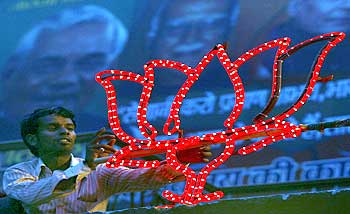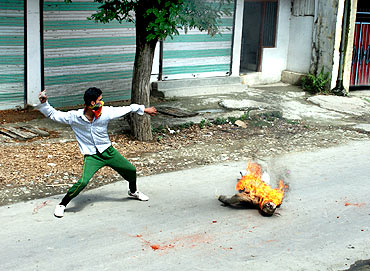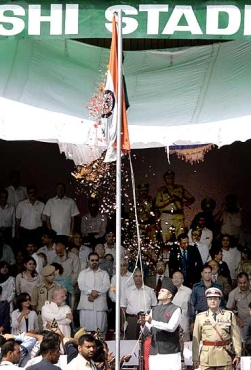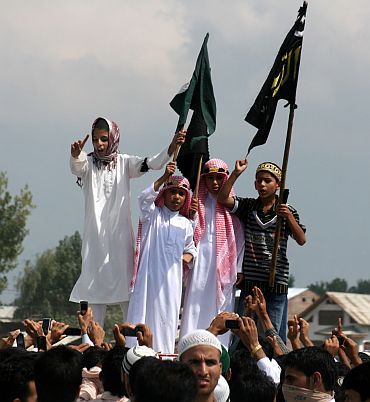Photographs: Pawan Kumar/Reuters
The Jammu and Kashmir government on Thursday decided not to allow the Bharatiya Janata Party to hoist the tricolour in Srinagar on Republic Day. But the BJP is adamant about going ahead with its plans of unfurling the national flag at Srinagar's Lal Chowk to mark the culmination of its 6,000-km Ekta Yatra.
The yatra, spearheaded by the BJP's youth wing, started from Kolkata on January 12. After covering 2,000 kms across seven states, the yatra reached Delhi on Thursday.
At the forefront of the yatra is Anurag Thakur, president of BJP's youth wing and a member of Parliament from Hamirpur, Himachal Pradesh.
The yatra will now travel through Haryana, Punjab and Himachal Pradesh before reaching Jammu and Kashmir.
In an exclusive interview with rediff.com's Onkar Singh, Thakur claimed that the Constitution gives him the right to hoist the tricolour anywhere in India.
'We have crossed more then 2,000 kms'
Image: A protestor hurls stones at security forces in SrinagarPhotographs: Umar Ganie
When did you conceive the concept of Ekta Yatra?
(I conceived the idea) when stone-pelters, egged on by separatist elements, were holding Kashmir to ransom. They had set the Valley on fire. I thought of educating the youth about the grave realities of Jammu and Kashmir and the best way to achieve this was to hold the Ekta Yatra. As we pass through the various states, I keep on educating the youth about Kashmir.
Why did you begin the yatra from Kolkata?
This yatra began from West Bengal because our great leader Shyama Prasad Mukherjee (founder of Jana Sangh) was born in Kolkata and it will culminate in Srinagar where he gave his balidaan (sacrificed his life).
How are you covering the distance?
We are driving through different states in a cavalcade. So far, we have covered Jharkhand, Bihar, Uttar Pradesh, Maharashtra, Madhya Pradesh and Rajasthan before reaching Delhi. We have crossed more then 2,000 kms so far.
'Omar would be insulting the tricolour'
Image: Jammu and Kashmir Chief Minister Omar Abdullah unfurls the national tricolour during Independence Day celebrations in SrinagarPhotographs: Danish Ismail/Reuters
Are you sure that you would be able to hoist the tricolour at Lal Chowk in Srinagar?
If everything goes well, I should be able to hoist the tricolour at Lal Chowk on January 26.
But state Chief Minister Omar Abdullah has threatened to stop the yatra?
I would have been happy if Omar Abdullah had shown up at the border of the state and welcomed the yatra with a tricolour in his hands. I would have said that I have a brother as chief minister of Jammu and Kashmir, who is a staunch nationalist and honours the tricolour.
But his government has made it clear that they will not allow the yatra beyond Jawahar Tunnel?
I am aware of what Omar Abdullah is doing. He was in Delhi pleading with the Centre to intervene to stop the yatra. Now he is talking of stopping the yatra at the Jawahar Tunnel. He would be insulting the tricolour if he does not allow me to hoist the national flag at Lal Chowk.
'Why should the country pay for Nehru's mistakes?'
Image: Children chant pro-freedom slogans during an anti-India procession in SrinagarPhotographs: Umar Ganie
Do you think you will be able to reach Lal Chowk?
We will reach Lal Chowk. I repeat, any attempt to stop the yatra will be an insult to the national flag.
What is the main aim behind holding this yatra?
We are opposed to Omar Abdullah's statement that Jammu and Kashmir never merged with India. As far as we are concerned, Jammu and Kashmir is an integral part of India.
In 1971, when we had 90,000 Pakistanis army officers and men with us as prisoners of war, the then prime minister Indira Gandhi could have taken back the parts of Kashmir occupied by Pakistan in exchange for the release of prisoners. But unfortunately she did not do that. First her father Pandit Jawahar Lal Nehru made the blunder of announcing a plebiscite in Kashmir and then she made the second major blunder. Why should the country pay for their mistakes?
So what do you want?
We want Article 370 (granting special status to J&K) to go. The temporary solution has become a permanent headache. We oppose the suggestion of reverting to the pre-1953 situation, which means two constitutions, two prime ministers and two heads of state and no jurisdiction of the Supreme Court in the state. Jammu and Kashmir is an integral part of India.





article